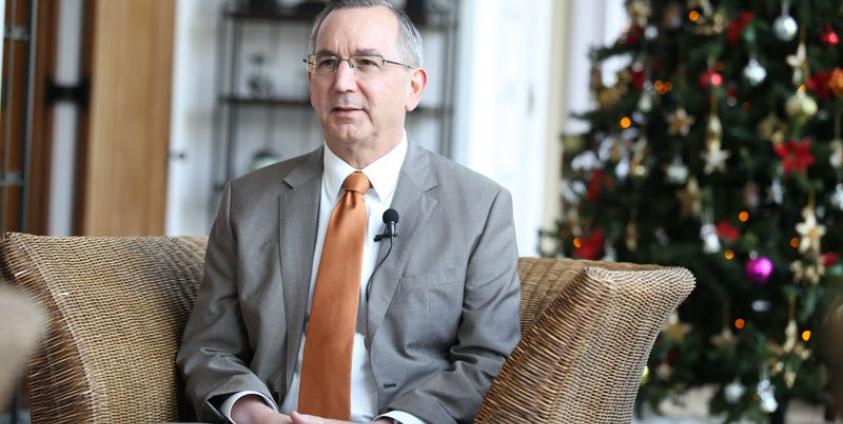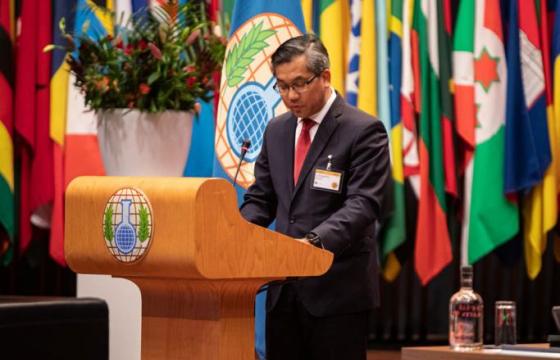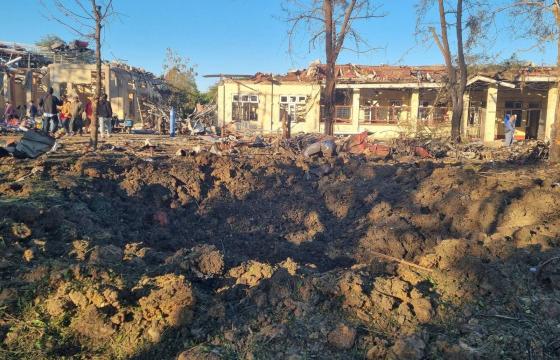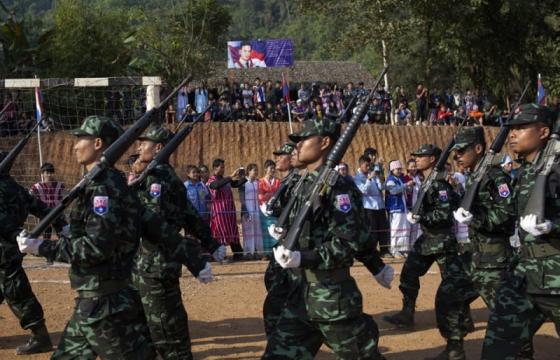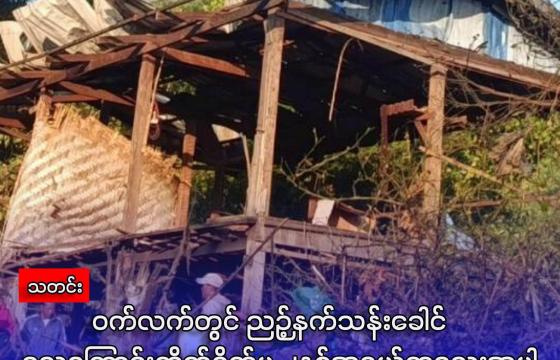US Ambassador Mr Scot Marciel sat down with Mizzima Editor in Chief Soe Myint this week for an exclusive interview to examine Washington’s views on developments in Myanmar.
We are now ending 2017 and looking to 2018. Let me start with a very challenging issue that Myanmar has been facing with the Rakhine crisis. The crisis has been making news for all the wrong reasons. What is Washington's position on this?
All along for many reasons as you know we wanted Myanmar to succeed. And what I mean by that is we have been on the side of the people who have been working so hard and sacrificing so much for democracy, peace and prosperity. And we have been pleased to see a lot of progress in recent years.
The Rakhine crisis is an immense challenge, not just because the international community cares about it but really for Myanmar, what kind of country Myanmar wants to be, and it is a very difficult, complex challenge, and we recognize that.
The way we see it is there is long-standing underlying problems there that I think the government has recognized and asked the advisory commission led by Kofi Annan to help address. And then you have those ARSA attacks, first in October of last year and then on August 25, which we condemned, and continue to condemn. That was a terrible thing to do that started this latest round of violence.
But then what we saw in response to that is the security forces, who had the right and appropriately had to go in and deal with the security threat, frankly responded with disproportionate force. And increasingly over time we see very severe human rights violations that Secretary of State Tillerson who has constituted ‘ethnic cleansing’. So I know nobody here wants to hear that, of course, and we understand that. But we feel that as a friend, a country that really wants Myanmar to succeed, we have to be honest about these things. And also as a country we have had plenty of our own difficult chapters in our history. But we think it is important to confront it, address it, investigate it seriously and independently and try to have accountability. I think that is how Myanmar as a country can move forward and build its democracy. So our hope is to be a good partner and help the people of Myanmar as you grapple with this.
My understanding is the message from the Myanmar authorities, either the civilian government or the military is that if any human rights violations did happen, please give us evidence and we will deal with it. That is the kind of message that is coming from the Myanmar authorities. What do you think of that message?
We have heard that message and there is a lot of evidence. A lot of us have collected significant evidence – Amnesty International, Humans Rights Watch, Medecins Sans Frontieres – have all done extensive research on this and I am sure would be pleased to present their findings to the government. We encourage the government to be open and welcome it. But the other point is that these allegations took place on Myanmar soil in Rakhine. Journalists and investigators have not had access. So the way to get the evidence is to allow that access. To say, please give us evidence but we won’t give you access doesn’t really frankly make sense. I think if you want the evidence then the way to go ahead and to clear things up for everybody – the Myanmar people and the international community – is let in a credible international investigation. Let in journalists to go see and ask questions and find out the fax. I think everybody should want the facts. But not allowing access is a huge obstacle.
I think the Rakhine crisis also puts the civilian government in a very difficult situation. The question is over sanctions that the United States has been mulling. My question is – are sanctions an appropriate response to such a crisis?
Well I think a lot of things need to happen in response to the crisis. And again not for the international community but for Myanmar’s own healthy democracy and so I think a credible independent investigation and accountability based on that investigation is critical, as well as an honest dialogue among the Myanmar people about how did this happen, what can we do to make things better. So I think that is most important.
In terms of the US role or sanctions, Secretary Tillerson, when he was here, did stress the importance of accountability and did talk about the possibility of sanctions on those we believe were directly involved in these atrocities. And it is something we are looking at, the idea of sanctioning individuals who we believe played a role directly in these human rights violations. We are not talking about reimposing the old broad so called Burma sanctions. That is really not what anybody is talking about. It is possible that targeted sanctions as a means of accountability to gain accountability for what has happened.
What we know is through the Myanmar-Bangladesh bilateral agreement preparations are underway for the return of the refugees to their homes. How would you like to see the process to be transparent and accountable and also satisfactory to the international community?
This is a very good question. We would certainly welcome the government’s commitment to welcome back on a voluntary basis those people who fled and want to come back. We think that is a positive step.
Going forward, of course, it will be critical to create an environment that encourages people to come back. That means making sure they feel safe but also the other communities living in Rakhine also feel safe and secure because everyone right now is quite concerned and feeling insecure. But also addressing some of these underlying issues, the institutional discrimination that so many people are suffering for a long time, so I think to the extent that the government is able to address those underlying problems as it has committed to do and create a secure environment for people to come back, then I hope that will happen in a way that people do feel comfortable, come back, and are able to live in harmony with their neighbours in Rakhine State. As you mentioned, transparency on that is very important and ideally the government will allow not only international press but local media to go up and have good access and be able to follow these developments very closely. I think that benefits the Rakhine people and other ethnic minorities as well as those in the Muslim community.
The Rakhine crisis is part of the bigger issue which is Myanmar’s overall peace process. How do you view progress on the peace process?
I think we are very engaged on that and also very supportive because we agree with the State Counsellor that a successful peace process is critical for Myanmar’s success and prosperity over time. So we are strong supporters.
It’s a slow process. I think everybody knows that plenty of people have complained about it. I think is partly slow just because of the complexity. You have so many different groups involved. There is no easy way or fast way to make this happen. What we hope to see is continued dialogue, continued efforts to reach out and understand each other’s position. Willingness is very important. And we would also love to see is an end to the fighting. Even as we speak there is quite significant fighting going on again in Kachin – artillery, air strikes, that we are hearing about and that to me does not create the trust that is necessary, so we would love to see, and hope for, an end to that fighting as quickly as possible and then redoubled efforts on all sides to reach out and have open dialogue and gradually build trust so that the peace process can move ahead.
What help can the United State provide in terms of discussions, in terms of bringing partners together, because there are many groups involved, both from the ethnic minorities or ethnic nationalities side and also from the side of the authorities, plus there are the civil society groups and women’s groups. How can the United States help in this process?
That is a good question. And what we are trying to do is we recognize – this is a Myanmar process, so the Myanmar government and the ethnic armed groups and others are obviously in the lead on this and our role is not to interfere but where we can support we do. And the way we support is a couple of ways. One, talking to the different actors which we do regularly, trying to help promote understanding, promote dialogue, try to get people to continue talking to each other. That is just the basic diplomacy that we are doing on a general basis.
Also trying to help people learn about federalism, these are some of the issues you will have to grapple with as you move forward in the political dialogue. So for example, we brought a group of people from the government, the military, the ethnics groups, civil society, to the United States to study federalism. We had a follow up conference in Nay Payi Taw a few months ago, again, talking about federalism. Not to say you should do it our way so much but just to explore some of the issues. So we think there is more we can do with that to help you decide what issues do we need to resolve, what are some models that have worked in other countries. We think we play a helpful role in that process.
I would like to go into the issue of media freedom and development in Myanmar which I think we agree is very important for the democratization process in Myanmar. Your embassy was quick to make a statement following the recent arrest of two Reuters journalists. What is your position now on their particular case?
Well, again, we look at this from the point of view as a friend who wants Myanmar to succeed and for a democracy to succeed there has to be a strong and independent media and they have to be able to do their jobs. This is just absolutely fundamental to any democracy. And what we saw in this case is journalists doing their work, trying to get information that they can share with the Myanmar public and being arrested for it. It is very troubling. Not for us so much but for the media which is why we have spoken out quite strongly on this. Our understanding is they were doing their jobs, they were collecting information as journalists, as you well know, as journalists are supposed to, for the benefit of the Myanmar people.
So we think their arrest is very troubling, we have urged that they be released. First, no one has had access to them, which is also very troubling. It has been more than a week since they were arrested. Where are they? Are they okay? We don’t even know that. So the first thing we would hope to see immediately is that their lawyers, their family be granted access to them and they would be reassured that they are in good health. But second I think it is very important that frankly they be released. Again, not as a favour for the United States but because this is important for the health of Myanmar’s democracy.
They are charged under the Official Secrets act which could result in them being jailed for up to 14 years. Apart from your statement and United States’ position, what will the US government be doing specifically with the Myanmar authorities for their immediate release?
Well we will continue to talk to the Myanmar authorities and urge their release and pointing out as I have just said that Myanmar has to make its own decisions about this, of course, but this long after they were arrested is along wit the colonial days which frankly, with all due respect, is not consistent with modern democratic practices. Again, journalists need to be able to do their job if democracy is to succeed. I have no doubt that the leadership of this country wants democracy to succeed, I know they are very committed to it, so I hope they will do all they can to secure the release of these people, and then, again, this is a decision for the Myanmar people but I would hope that parliament would take another look at some of these laws and see if they are really appropriate for a democracy.
Including this recent arrest of these two journalists, I think media freedom in Myanmar is under threat currently and we all see that media freedom is crucial for the democratization process. How should Myanmar respond to such threats that have going on over the last two or three years, especially including the overuse of Section 66(d) of the Telecommunications Act relating to defamation. How should Myanmar, as a nation which is transforming into a democratic society, respond to this?
This is a good question. As a foreigner I can only say what I hope will happen again, that is up to the Myanmar people, but I think there is enough freedom and enough space now for the public to make its views on this known through a peaceful, democratic way. Whether it's by statements, or on social media, or talking to representatives of parliament whatever they think is appropriate to make it clear people have voted for democracy and they want freedom and they want the press to do its job, and then you have a democratic process. Nowhere in the world is a democratic process perfect including the United States but there is enough structure of democracy and enough freedom here that I think people have space if they want to make their voices heard and I think I am optimistic that elected leaders will listen to the people’s voices.
The previous U.S. administration has shown commitment to Myanmar and its democratic transition with President Obama visiting the country twice. What about the current administration of President Trump? Is there any active interest in Myanmar?
I was just in Washington a few weeks ago, and I can tell you there is tremendous interest in the administration, in our Congress, in the press, civil society groups and of course Secretary Tillerson was just here a month ago and saw the State Counsellor and Commander-in-Chief and spoke very openly and directly about our continuing strong support for Myanmar and its democratic transition and maintaining our high levels of assistance and all of our programmes so I can tell you our commitment to support democracy here remains very strong.
If we look at other issues regarding economic development in Myanmar, it seems that over the last two years it has been slowing a little. Are American companies interested in coming to Myanmar? Does the negative news in the international media reduce their interest in coming here?
Well, I think with Myanmar opening starting several years ago and continuing through the elections and the new government is coming in there was a lot of interest from U.S. companies because they hadn’t had the opportunities before and a number came to invest and other came looking for opportunities, and that continues. I think there are two factors to highlight. One is like a lot of Myanmar business people they are looking for more clarity in policy, what is the government looking for, what is its vision, so they are looking at that side certainly. Moreover, second, clearly this crisis is having a negative impact in a couple of ways, one is tourism, a lot of people are hesitant to come until the situation improves. Second I think for companies it has raised a lot of questions they worry about their reputation in working in a country which now getting a lot of negative press. So, I think at least in the short term it as a negative impact, but we just had a US business delegation here a couple of days ago so think the crisis has hurt, but going forward there is an opportunity to rekindle that interest not only from the U.S. but I think from other countries as well by addressing the crisis very openly and by continuing to make progress on the economic front. So, my hope is that over the first half of next year we can see steps that address the Rakhine crisis very frontally and also progress on the economic reforms and I think if those two things happen you will see investor interest pick back up.
In terms of business, Myanmar has a new company law many people say is very proactive and good for business. What is the thing you think Myanmar needs to still focus on in terms getting foreign investment? What are the challenges Myanmar needs to look at?
I will mention some challenges, but as I do that I would like to say that every country, including the United States, has economic challenges, so it is not that Myanmar is the only one. Certainly implementing this companies act is going to take a little time I think to fully implement that. I think continuing to strengthen the financial sector, continuing to approve reforms to the banking sector. Critically I think the government is laying out a clear vision and policies and this is something I hear not only from U.S. companies. More communications from the government – here’s what we are planning to do, here’s our policy – with as much detail as possible is extremely helpful. And continued efforts to build infrastructure, all these things, electricity, concerns about whether there will be sufficient amounts of power is one big issue and continued efforts to build up the capacity of workers, skilled workers, again this is something that is not unique to U.S. companies but to all. Some of these things can be done relatively quickly others take more time. But I think as long as companies see progress and movement and good communications plus, as I said, addressing the Rakhine crisis very openly, and frontally I think a combination of those things will have a very big impact.
You have seen the National League for Democracy move from being an opposition party to taking up power over the last two years. What is your personal opinion on the performance of this democratic government whichhas only been in power for a short period?
I think it is important to say that this government came in and inherited enormous challenges and didn’t have a lot of experience in government. That is not their fault, it is just a reality. So I think we knew this would be a challenge it would take time I think they have accomplished some very positive things. But, I have been all over the world I have never been anywhere where people are fully satisfied with how a government is doing. A government can never do enough, so I think there are areas for improvement. What I here the most specifically from my Myanmar friends is a hope the government will do more communicating, will do more laying out of its policies and its visions to the public. That is something that could be strengthened in all honesty in the current government and think that could go a long way. There are a lot of specific things as well as governance challenges and so on and being able to strengthen the governance so that decisions made in Nay Pyi Taw are actually carried out at the state level, which is hard in any country, but I would focus mostly on communications – here’s what we are doing, here’s why, and here’s how it is going to affect people.
If you look at the last two years, in your opinion, what is the best policy the current government could have achieved and has achieved so far?
I think there has been a lot of progress on passing new laws and changing some old out-moded laws. I think progress on releasing political prisoners; there’s been a lot of work on infrastructure, I see when I travel around the country I see roadwork and electricity, these kinds of things happening throughout the country. I think a strong commitment to fighting corruption – it is hard to get rid of corruption – but I think we have seen out of this government a strong commitment from the top to fight corruption and strengthen the rule of law. I think there has been a lot of good work in economic reforms including in the financial sector. So I think there’s been a lot of good work. It is natural around the world to focus on what hasn’t been done, but I think it is important also to recognise good work. Continued movement on peace if it hasn’t been as fast as people would like. I think continuing that peace process is critical.
I’m asking this question because I think Washington championed Daw Aung San Suu Kyi in the years leading up to the 2015 election. Now she has been facing tremendous international criticism from the international community at large especially on the Rakhine issue. Personally, or as representative of the United States government, how best do you think she should handle this situation?
Well, I have a lot of respect for her personally. She has sacrificed and done so much for the country and continue to have a great deal of respect for her. But I think it is a mistake to put it all on one person when someone is as important as she is because whether it is the United States or Myanmar you don’t build a democracy with just one person. This is something that requires effort not only by everybody in government but by society as a whole. And so we continue to be strong supporters of the government, the State Counsellor-led government. But even more important, we are strong supporters of everybody who is working to build a stronger more peaceful, prosperous and democratic Myanmar and so again not to take anything from the State Counsellor’s role which is hugely important, I think it essential to emphasize this is a societal effort and it is good that the media, civil society, people at the union level but also at the state and local level - we want to work with all those people to try to help to make progress. And clearly the State Counsellor play an essential role and yes she has gotten a lot of criticism, I don’t want to speak for her but I thnk she knew when she went into this position that political leaders tend to get a lot of criticism as they do in the United State, in Europe, everywhere that is unfortunately part of the business of being in government, and politics.
Lastly, now we are ending 2017 and looking forward to 2018 and looking forward to the next three years of the current government. How do you view Myanmar over the next three years in terms of democratisation and transforming from a dictatorial regime to a democracy?
I don’t want to make too many predictions, because usually when I make predictions I am wrong. What I would say is I would go back to something Secretary Tillerson said a few months ago. It was about Rakhine, but really it about all of Myanmar – that this crisis is a cross-roads for Myanmar and I think it is a terrible tragedy, a human tragedy what’s happening to a lot of people during this crisis. But going forward, how Myanmar grapples with this, not just the government, and the military, but also the public as a whole, media, everybody is going to tell us a lot about the future of the country. I hope as a friend, and someone who cares deeply about this country, that people and media and the government will take a hard look at what has happened – acknowledge some fairly substatial failings, and again we have had failing too I am not trying to be too harsh, and address those very honestly. Because what we’ve seen over the last few months has been a very strong nationalist push and pressure which I understand thre is a feeling of being under pressure from the international community and people respond to that, it is human nature and I fully understand it. But I hope for the sake of Myanmar’s democracy that people will be able to step back and look and say let’s have a honest discussion about what’s happened and about and what kind of society we want to be going forward and let’s here different views and then based on that make our decisions on how we want to move forward as a nation. And I think if Myanmar is able to do that I am wildly optimisic about this place.
Is there any particular message you would like to give to the people of Myanmar?
Just that it is a difficult time for a lot of people right now. We understand that. It is easy as a outsider to say these difficult times happen and you have to work through them, but my government, the American people, and I think a lot of the international community, we really want you to succeed, we are really hoping for the best and that is very sincere and we remain partners, not only with assistance through money but as friends who really want to work with you and support you as you work through a very challenging time and wish you nothing but the best for the future.

